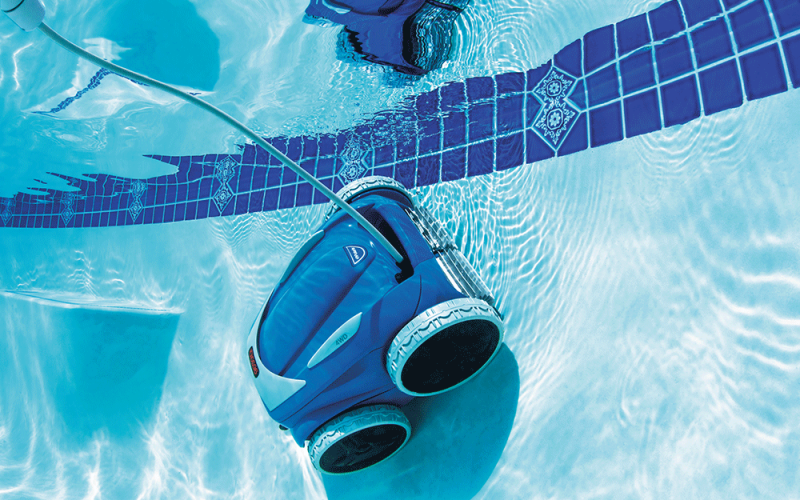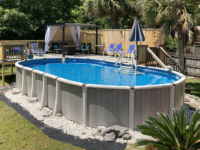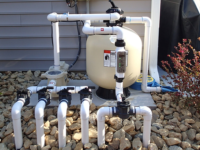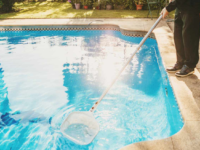Do you want a pool that is always sparkling and crystal-clear? A robotic pool cleaner can make that happen. It will automatically clean your entire pool, including the walls and steps.
There are many different brands of robotic vacuums on the market today. We’ve compiled all the information you need to know about them, so you can make an informed decision on which one is best for your pool
How do robotic pool cleaners function?
Robotic pool cleaners work according to the principle of “sweeping”. To clean a large area, it is necessary to make many turns and every time completely cover the space. In this case, as practice shows, there are no places on which attention was not paid.
The principle of the operation of pool cleaning robots is very simple — they move along the bottom and sides of the pool and clean the area. For this, during operation, you need to set a cleaning cycle and length. The longer it will be, the more often the cleaner will pass over one place — for example, once every hour or two hours. But if the pool is very dirty, the cleaner will have to make more cycles. Many robotic cleaners have a built-in filter to catch large debris, which allows you to save additional equipment for filtering water (as in canister filters) and reduce energy costs during operation.

Things to сonsider before choosing a robotic pool cleaner
When choosing a robotic pool cleaner, you should consider several important factors:
Pool floor material
This is probably the most important factor to consider when selecting a robotic pool cleaner. It is always worth checking what type of surface your pool has: concrete, vinyl liner, or fiberglass.
Concrete-type surfaces are the most challenging to clean. They are usually very dirty and have a lot of small particles that can clog the filters. So, it is important to select a cleaner that has a good filtering system and strong suction. If the surface is made of concrete or another hard material, then it will be necessary to choose a robotic pool cleaner with strong brushes and rubber wheels which have good traction on such surfaces.
A robot vacuum cleaner can also become an excellent helper in cleaning fiberglass pools if its cleaners are fitted with a specific brush for this type of material.
In addition, robotic vacuum cleaners can be divided into two types — those designed to clean the floor and walls and those that can only clean the floor. In this case, if your swimming pool has a vinyl liner or fiberglass surface on the sides, then you need to choose a robot cleaner with brushes suitable for such pools.

Pool shape
The size of your pool is also an important factor to consider when choosing a robotic pool cleaner. Choose a model that is designed for your pool’s specific dimensions.
For example, if you have an irregularly shaped underground pool with sharp bends or curves that are difficult to clean without special attachments for robots, then it is better to purchase one equipped with such “extensions”. Because of their special design, they will be able to reach all the difficult-to-reach places and clean them properly, unlike robot vacuum cleaners with circular brushes.
If your pool is rectangular or oval-shaped, then you can choose a cleaner with rotating brushes that will clean the pool surface evenly. The best option would be to choose one which has two sets of interchangeable rotating brushes — one for the floor and another set for cleaning walls.
Two rotating brushes can be used for different purposes: one to collect large debris, and the other to remove smaller particles such as dirt and sand. So it is a great option for any type of pool.
Pool size
Pool size is another important factor you need to consider. The size of the pool determines how much time you need to clean it.
Smaller pools require less suction power and can be cleaned by single-wheel drive cleaners, which are relatively inexpensive. Larger pools, on the other hand, require more suction power and should be cleaned with a four-wheel-drive or a track drive robotic pool cleaner; they have better traction and can move around the pool more easily.
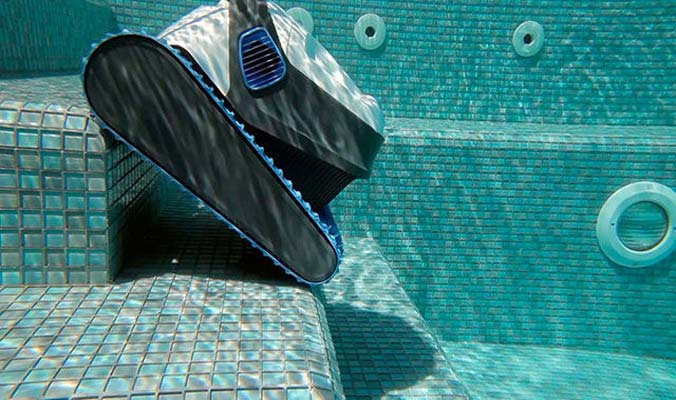
Filtration capabilities
A good robot pool cleaner must have a filter that captures the smallest dirt particles and is easy to clean. If you want to get rid of germs, bacteria, etc., it’s necessary for the dust bag or cartridge-type filters in robotic pool cleaners to be able to retain ultra-fine particles as small as 0.03 microns. This will help to keep the pool water clean and clear.
Programming and scheduling
A good programmable robotic vacuum cleaner allows you to adjust not only the time and frequency of operation but also select surfaces on which they will be cleaned (different types of surfaces require different modes of operation).
Many robots for the pool have a special program that allows you to clean all kinds of debris in one go. You can choose from several options: “large” mode, which is suitable for cleaning leaves and twigs with the large surface; “small” mode – this option will allow you to catch small particles of dirt and sand; “whole pool” – this option will allow you to clear all the water surface from dust, debris, and other impurities.
If your robotic cleaner for the pool does not have a programmable cleaning cycle or enough modes of operation, it is better to look at other options.
Pros and cons of robotic pool cleaners

Pros of robotic pool cleaners:
- Energy efficiency
You can see how much energy your robot consumes after every cleaning cycle, so you have control over the cost of maintaining it. Some models even allow to set up a timer for power-saving modes when not needed or used at a certain time of the day.
- Time efficiency
You won’t have to spend hours manually cleaning your pool anymore. A robotic cleaner will keep it clean for you, working every single day with no exceptions. Just try how much time you can save by not having to scrub and brush stubborn dirt off the walls of your swimming pool!
- Efficiency in general
Robotic pool cleaners do not get tired and will work every day, no matter the weather conditions. They don’t need to be rested or recharged; they just keep working for you!
- Hassle-free pool maintenance
No need for any additional equipment — just turn it on and let the unit do its job, while you enjoy summer days under the sun.
- Maximum pool coverage
Pool cleaners are equipped with large diameter hoses which allow them to clean the entire perimeter of your swimming pool at once and without missing a single spot.
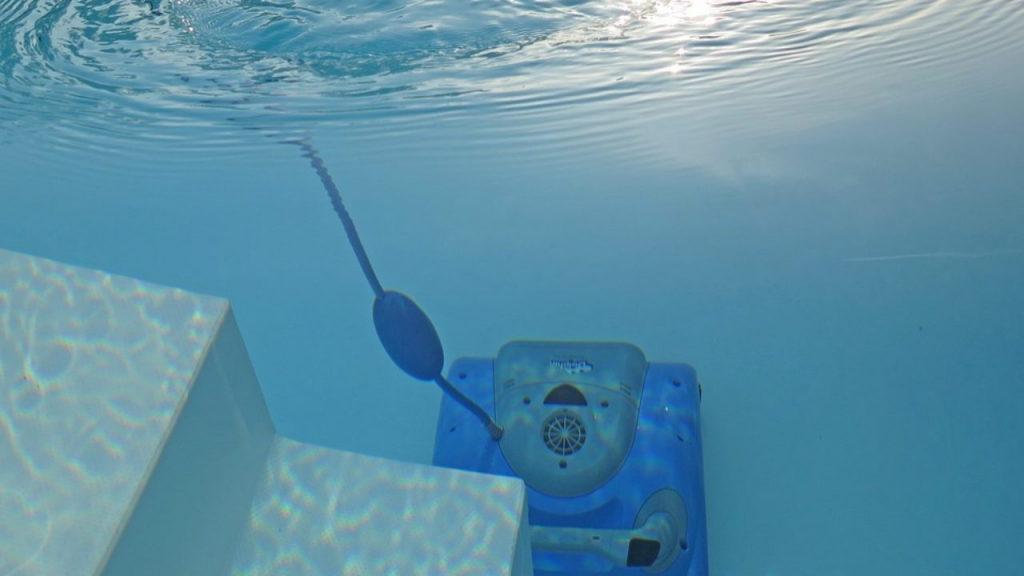
Cons of robotic pool cleaners:
As you can see from the above-listed benefits, owning a robot vacuum cleaner for the in-ground or above-ground pools has many advantages. However, there are some disadvantages that you need to know about before making the purchase:
- Pricey
Compared to other types of pool cleaners (such as suction or pressure), robotic units can be pretty expensive; however, their price is still lower than installing a completely new swimming pool! And remember — what’s important isn’t the price itself, but what you get in return.
- Limited warranty
Some robotic cleaners do come with a limited warranty, but they can be as short as just one year. In most cases, the unit itself has a standard two or three years’ manufacturer’s warranty, so try to avoid products that have extremely low warranties (such as 30 days) and go for models that offer at least one year warranty.
- Frequent maintenance
You will have to clean the robot’s filter and empty its debris box every time after it finishes a cleaning cycle, otherwise, your pool might be filled with dirt in no time! Luckily this is a very easy task that takes only a few minutes of your precious time. All filters can simply be rinsed under running water or thrown into the dishwasher, and debris boxes can be emptied by hand (or even washed with a garden hose).
- Limited cleaning cycles
Some robotic cleaners come equipped with just one or two different types of programmed cleanings, which means you will have to manually switch between them every time after the robot finishes one of them.
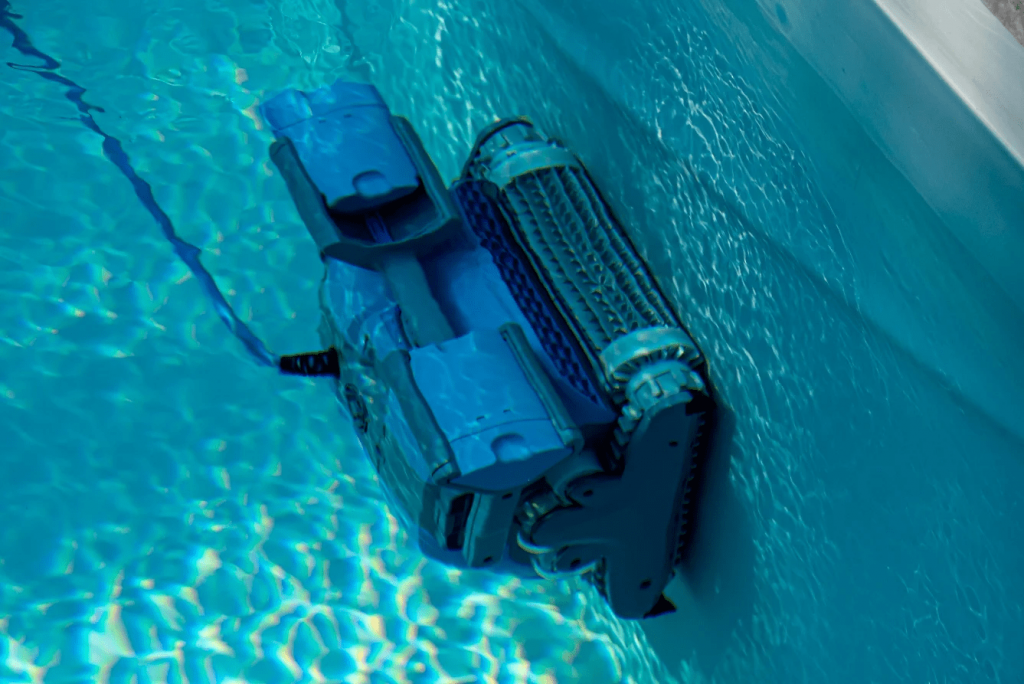
Summary
Robotic cleaners are great for pools. They are easy to use and maintain and can save you a lot of time and effort.
Robotic cleaners have been around for over two decades now and quite a few models exist on the market today that vary in features, price tag, etc., so choosing one may prove to be a daunting task.
Here are some things to keep in mind when choosing a robotic pool cleaner:
- The shape and size of your pool;
- Filtration capabilities;
- Programming and scheduling.
Using these criteria, you can find a robot vacuum cleaner that fits your needs effortlessly.
FAQ
📌 How to use a robotic pool cleaner?
Robotic pool cleaners are easy to use. You can set it up on the ground, attach a cord and plug it in. Make sure that the filter box is attached properly — all buttons work correctly, etc. Then just throw your robot into the water, let him do his job for about one hour or more if needed.
⚡ How much power do I need for a robotic pool cleaner?
The more powerful the suction is, the better the cleaning robot you can get. In general — it’s about 1800W of power to make sure that your vacuum does its job well and rinses all surfaces.
❓ Can these cleaners get stuck in small spaces or obstacles like ladders, stairs, and corners of steps inside your pool?
For sure, any robotic pool cleaner can get stuck in small places. If you want to make sure — test your robot vacuum cleaner before the season starts; try to find all possible obstacles and see how it works.
🧐 Are robotic pool cleaners safe?
Robotic pool cleaners are safe for people and pets. They do not use any harmful chemicals or chlorine, so you can let them work if your pets are in the pool.
